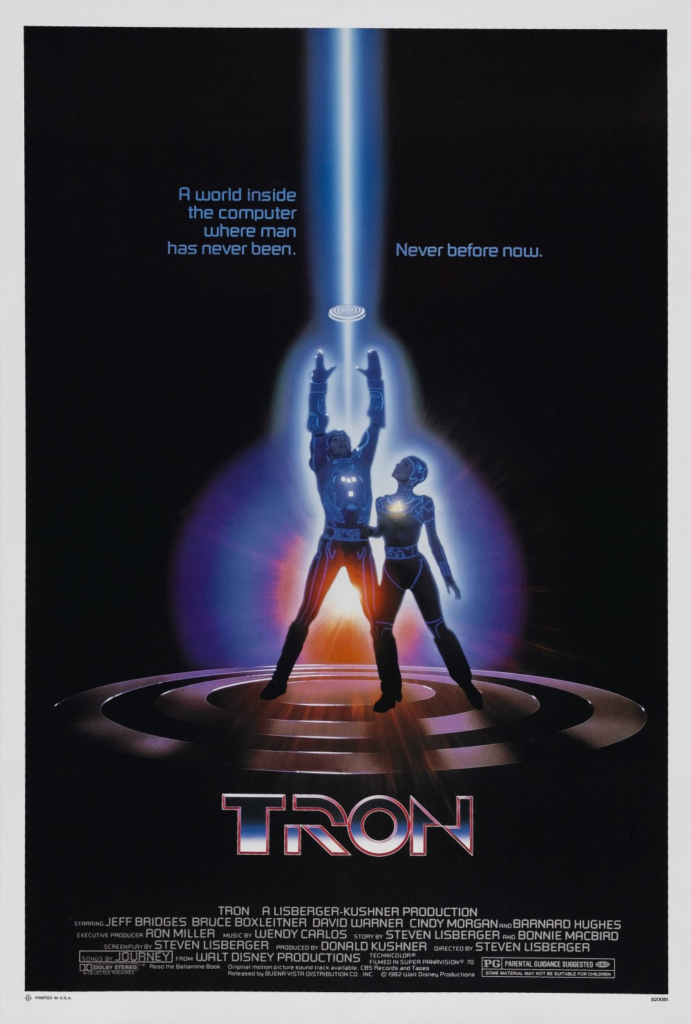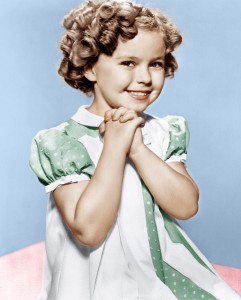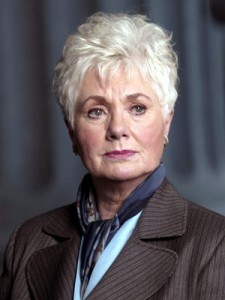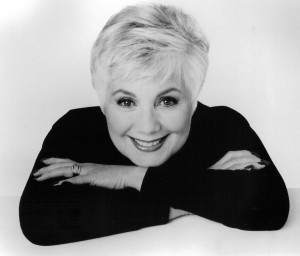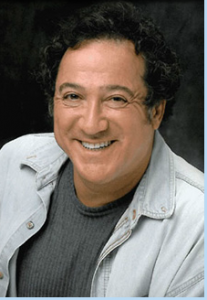Depending on your age you’ll have different memories of Shirley Jones. For my parents era they will be of her roles in some of the most popular movie musicals of all time, including “Oklahoma,” “Carousel” and “The Music Man.” If you’re my age you remember her best as Shirley Partridge, working mom and vocalist on the popular television series “The Partridge Family.” Young people today remember her as the randy Grace in the comedy “Grandma’s Boy.” No matter your memory, it’s safe to say that Shirley Jones has had one of the most incredible careers in the history of entertainment.
Born outside Pittsburgh, a lucky bus ride put Ms. Jones on the path to stardom. Intending to become a veterinarian, she instead walked into an audition for the musical team of Richard Rodgers and Oscar Hammerstein II. So impressed was the casting director that he called both gentlemen at their homes and had them come listen to her sing. Two weeks later she was on Broadway and the rest is history. Twice married (to the late Jack Cassidy, father of her sons Shaun, Patrick and Ryan) and currently celebrating almost 36 years with comedian Marty Ingels, Shirley Jones has certainly lived an incredible life.
Media Mikes spoke to Ms. Jones recently in conjunction with two upcoming events. The first is a benefit screening of the film “Carousel” in Omaha on May 24th. The second is the upcoming release of her autobiography to be published next month by Gallery Books.
Mike Smith: How does a young girl from Pennsylvania end up becoming an Academy Award winning actress?
Shirley Jones: (laughs) It’s a stroke of luck. I was very fortunate at my first audition in New York. I was actually on my way to college to become a veterinarian. I wasn’t going to be in show business I was going to be a vet. I had graduated from a small town high school. I went to an audition for Rodgers and Hammerstein’s casting director and he called both Rodgers and Hammerstein to hear me. I sang for them and two weeks later I was in my first Broadway show. That’s how fast it happened. I spent three months in the Broadway production of “South Pacific.” Then they flew me to California to screen test for the role of Laurey in “Oklahoma,” and that’s how that happened. And it all happened in less than a year.
MS: And they say show business isn’t easy!
SJ: (laughs) I know. But you know something, I’m not sure that could happen today. It was just the time…where I was…it was one of those things that happen rarely. I was the only person put under personal contract to Rodgers and Hammerstein. I was never under contract to a studio.
MS: What was that experience like…to have your career guided by two genuine legends?
SJ: incredible. It truly was incredible. It was so great for me. I did three shows while under contract with them. By the time I got into movies the studio system was over so in a way it was the best thing that ever happened to me. Because then I went on to do everything, from television to films and everything else. And Rodgers and Hammerstein were so wonderful to be with and work with. They produced the movie version of “Oklahoma,” not the studio. We did some shooting at MGM but the majority of it was shot at Nogales, Arizona. They were on the set every day for seven months.
MS: You’ve appeared in some classic movie musicals. “Oklahoma.” “The Music Man.” “Carousel.” Do you have a favorite among them?
SJ: My favorite score is “Carousel.” Without a doubt, of all the things I’ve done, that’s my favorite. I think it’s some of the most beautiful music ever written. In fact, Richard Rodgers always claimed it was his finest work. When I perform in concert I always open with “If I Loved You” and I close with “You’ll Never Walk Alone.” To me it’s the most beautiful music. The movie is wonderful, though I thought it could have been a little bit better. We had a very old director (Henry King, director of films like “Twelve O’Clock High” and “Love Is a Many-Splendored Thing”) but a great cast. Frank Sinatra was scheduled to play Billy Bigelow. We had done all of the rehearsals…even all of the pre-recordings, which is what we did back then. We had spent three months in pre-production. We were going to shoot the film in two separate processes – regular Cinemascope and Cinemascope 55 – and when Frank got to the set in Maine he asked why there were two cameras. Henry told him we would be shooting each scene twice. Frank told him, “I signed to do one movie, not two,” got in his car and drove back to the airport. So I got Gordon MacRae on the phone, who was in Lake Tahoe doing a nightclub act with his wife, and I said, “how would you like to play Billy Bigelow in “Carousel,” and he said “give me three days I have to lose ten pounds!”
MS: What a great call. I’m a big Sinatra fan but I can’t see anyone but Gordon MacRae in that part.
SJ: Me too. And that voice. Nobody sang like Gordon. He had the best voice of all time.
MS: You won an Oscar for your role in the film “Elmer Gantry,” a role many of your musical fans may not have expected to see you in. How did that part come along?
SJ: It was an incredible role. Burt Lancaster fought for me to play that part. By the time I’d finished doing musical motion pictures – “Music Man” hadn’t come out yet – Hollywood had stopped making musicals pretty much because the European market wasn’t very receptive to them. My career was pretty much over. When you were a singer at that time they didn’t consider you an “actress” so to speak. I went and did some television, which was looked at as a big step down for movie actors. They were doing some wonderful dramatic shows like “Playhouse 90” and “The Philco Playhouse.” But I had some wonderful roles. I had a great part opposite Red Skelton in a “Playhouse 90” show called “The Big Slide” and Burt Lancaster happened to have seen me in that part, playing an alcoholic “Sunshine” girl in the Mack Sennet era. And he loved my performance. And after he saw me he fought for me to play the role of Lulu Bains in “Gantry.” He called me while I was in San Francisco doing a nightclub act with my husband Jack Cassidy. I pick up the phone and I hear, “Hello, Shirley, this is Burt Lancaster.” I said, “sure it is” and I hung up! (laughs) Thank heaven he called back and said, “No, this IS Burt Lancaster.” He told me to go get the Sinclair Lewis novel “Elmer Gantry” and look at the role of Lulu Bains. On your day off he asked me to fly to Los Angeles and meet with the films writer/director, Richard Brooks. Of course I did as he asked. I flew in and met with Richard Brooks, who originally did not want me for the part. He had somebody else in mind. He was the writer/director but Burt was the co-producer and he was very definite about having me play Lulu, which was so great. I got the part. Richard Brooks would always shoot his films in sequence so I wasn’t due on set until the middle of the film. But Burt would have me come on set every day to watch the other actors and to watch how Richard Brooks directed. On my first day of shooting I had to do the hardest scene in the film – standing in the house of prostitution and telling the other girls how I had met Elmer Gantry – and I didn’t have one bit of direction from Brooks. He sat in his chair smoking his pipe like I wasn’t even there. I went home that night in tears thinking he was going to fire me. I didn’t have to work the next day and they screened the rushes of what had been shot the day before. Brooks called me afterwards and said, “Shirley, I owe you an apology. Not only are you going to be great in the film but I predict you’re going to win an Academy Award.” And that’s how that happened. Burt was the one that got me the part and it changed the course of my whole career. My career would have been literally over had that not happened. But I went on to do 20 more feature films after that.
MS: And now, of course, it’s time for the obligatory “Partridge Family” question.
SJ: (laughing) Of course.
MS: What do you think it is about the show, and the music, that it is still popular some four decades after it first premiered?
SJ: Well, it was really a new definition of a television series. I was the first working mother on television. I was actually offered “The Brady Bunch” first and I said “no” because I didn’t want to go into a television series and play a regular mom taking the roast out of the oven. But when I was offered “The Partridge Family” I thought it was very unique. The fact that the whole family was working together musically but you still had stories about the kids and the mama…I loved the idea. And the fact that David, my stepson, was going to play my son was just great. It also gave me an opportunity to stay at home and raise my kids, which was something I couldn’t do making films because I was constantly away on locations everywhere. When they were younger I could take them with me but now they were school age, which was another reason I wanted to do a series. And the agents and managers at that time were all telling me, “Don’t do a television series, Shirley, because if it is successful you’ll BE that character for the rest of your life.” They were pretty right about that but it was still great for me to do.
MS: They don’t make as many film musicals today as in the past, but some of the them are pretty well done. “Les Miz” comes to mind as a recent achievement. What is your opinion on the movie musicals of today?
SJ: I thought “Les Miz” was wonderful, but I’d also seen the Broadway show and thought it was divine. Everybody in the film was wonderful. Hugh Jackman is one of my favorite performers. When I was visiting Australia he and I did bits from “Oklahoma” together on stage. (NOTE: Jackman starred as Curley in an Australian production of “Oklahoma” in the late 90’s) He was just great. But they don’t do that many musicals anymore, as you know. But the ones they do do I think have been successful.
MS: You’re publishing your memoirs next month. What was it like to sit down and review your career?
SJ: It wasn’t easy (laughs). In fact I thought “do I really want to do this?” But it came out very quickly and easy. All of the things that have happened I was fortunately able to recall for the most part. And all of the people that I worked with…I worked with some of the greatest movie stars of all time. I’ve had two incredible husbands. Both crazy, but wonderful. I’ve got three incredible sons and an incredible stepson. I’ve got twelve grandchildren now. And I was an only child which makes it even more interesting.
